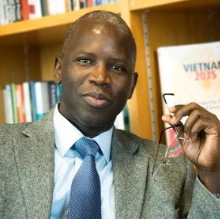 Minister of the Office of the Government Mai Tien Dung (left) and the author tested the newly launched National Public Services Portal in December 2019.
Minister of the Office of the Government Mai Tien Dung (left) and the author tested the newly launched National Public Services Portal in December 2019.
There is no time when speed matters more than when a pandemic strikes. What’s unfolding with the COVID-19 pandemic worldwide speaks volumes to this. First detected in China last December, the novel coronavirus has travelled to 209 countries and territories globally, infected more than 1.9 million and claimed lives of more than 120,000 people at the time of this writing.
Vietnam took quick and decisive actions and is one of the few countries so far that has coped with the situation relatively well. There have been no COVID-related deaths and, as of April 14, only 266 infections nation-wide , despite Vietnam’s role as a regional trade powerhouse and a tourism hotspot.
Many of Vietnam’s swift and effective public health responses have been enabled by information technology. The country has put its high penetration of mobile phones (150%) and the Internet (70%) to great use. Alert notifications and reminders from health authorities to take precautionary measures are regularly circulated via text messages, websites and social media. There are mobile applications for universal medical declaration and to keep tabs on the pandemic development.
Seamless and timely citizen outreach and engagement is just one of many benefits digital technology offers in the face of pandemic. In the time of a contagious disease, social distancing—which involves a conscious effort to reduce close contact between people to slow and hopefully halt the spread of infections—is arguably the best way to stop the virus. That is why countries around the world are closing borders, cancelling large-scale gatherings, shutting down schools and asking people to stay home. These measures are disrupting everyone’s daily lives, but digital technologies offer a way to adapt to this “new normal”.
Digital technologies are a key enabler to facilitate home-based work, remote learning and home supply delivery, which have become essential in this time of pandemic. Vietnamese have been able to conduct certain businesses online and put this option to greater use since the outbreak hit in late January. The National Public Services Portal, which provides basic public services to citizens, has registered a significant surge in traffic. Visits to the portal jumped from 11 million in late January to over 28 million at the end of March, according to government data. During March, the number of online service transactions conducted via the portal doubled to more than 23,000.
Popular e-commerce sites report similar trends, as reported by online newspaper Zing.vn. Since the first case was reported in Vietnam, the leading e-commerce site Tiki has seen an explosion in the number of purchase orders, and big retailers have seen a dramatic increase in online sales. Saigon Co.op, for example, registered a five-fold increase in online sales in the following week after the first case was detected on January 23.
Yet in times of crisis, Vietnam could minimize disruption even further if it had a full-scale digital infrastructure. In a more digitized Vietnam:
- a majority of public services, not just a few, could be provided virtually;
- a credible digital ID system could enable full accessibility to digital financial services and other private sector platforms;
- virtual learning platforms for students at all levels, even at public schools with limited resources, would enable students to learn despite prolonged periods of school closure;
- big data diagnostic capabilities could aid health surveillance and forecasting;
- streamlined and efficient administrative procedures could expedite disbursement of public and ODA investments—critical resources to stem an economic fallout in a time of great uncertainty;
- an IT-enabled social assistance program could reach vulnerable groups and businesses regardless of their remoteness through digital transfers—one pilot project, financed by the World Bank, demonstrates the feasibility of this approach. More than 2,600 people of ethnic minorities in Cao Bang Province have received their monthly social allowance via mobile money.
The list goes on. But the benefits of a digital Vietnam will not materialize overnight, and there are of course associated risks, most notably data privacy, that must be addressed. What’s needed are consistent and targeted investments and an accompanying legal and regulatory framework to set the rules on how to operate and manage data in the digital space.
The Government of Vietnam is already committed to the digital transformation agenda. Its efforts to build various e-Government systems such as the National Public Services Portal and the eDocument Exchange Platform , as well as ongoing initiatives to ramp up systems during the pandemic are laudable. And the country is also looking to harness the potential of digital payments technology as part of the new national financial inclusion strategy approved in January.

A user submitted an online request through the National Public Services Portal
COVID-19 has been a test for every system, from the country to individual level, revealing both strengths and weaknesses. It is a reminder that Vietnam could benefit a great deal from digitalized services and should push the digital agenda even harder and faster. Digital technologies not only help promote inclusive growth, they can also make us more resilient in times of crisis – enabling us to manage the impact of social disruption while remaining virtually connected and productive – and fed!
This piece first appeared on Vietnam Investment Review.


Join the Conversation